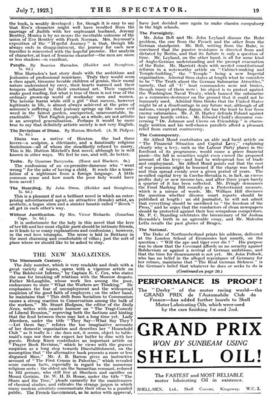The Fortnightly.
Mr. John Bell and Mr. John Leyland discuss the Ruhr problem, the one from the French and the other from the German standpoint. Mr. Bell, writing from the Ruhr, is convinced that the passive resistance is directed from and dictated by Berlin, and that its failure is only a question of time. Mr. Leyland, on the other hand, is all for some kind of Anglo-German understanding and the prompt evacuation of the Ruhr. Mr. Marriott deals with needed constitutional reforms in a noteworthy article on "Cabinet-making and Temple-building," the "Temple" being a new Imperial organization. Admiral Sims states at length what he considers to be "The Truth about the German Submarine Atrocities," namely, that all 'U' boat commanders were not brutes, though many of them were ; his object is to protest against the Washington Naval Treaty, which banned the submarine as a commerce-destroyer on the ground that it could not be humanely used. Admiral Sims thinks that the United States might be at a disadvantage in any future war, although of all nations, except perhaps Japan, she has the least to fear from enemy submarines. Mr. J. H. Harley defends Poland against her many hostile critics. Mr. Edward Clodd's discourse con- cerning Dr. Johnson and Cicero on Friendship" is charm- ingly written and his well-chosen parallels afford a pleasant relief from current controversy.














































 Previous page
Previous page